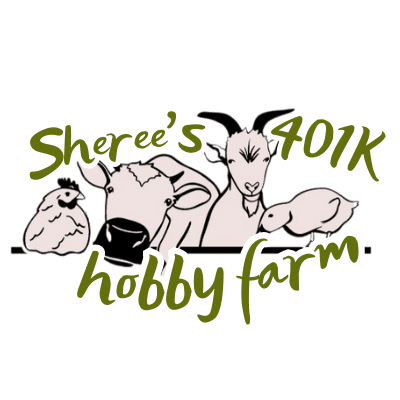The Joy of Farm Animals: Choosing the Right Livestock for Your Homestead

Posted on October 3rd, 2023
As someone deeply passionate about farming and the harmonious coexistence of humans and animals, I find immense joy in sharing my insights and experiences on selecting the perfect livestock for your homestead. At Sheree's 401K Hobby Farm, I've dedicated myself to understanding the unique needs and benefits of various farm animals. In this comprehensive guide, I'll walk you through the factors to consider when choosing your farm's companions, helping you make informed decisions that align with your goals and dreams.
Understanding Your Homestead's Goals
Before diving into the world of farm animals, it's essential to define your homestead's objectives. Ask yourself what you hope to achieve. Is it self-sufficiency, sustainable living, or perhaps generating income through livestock? Understanding your goals will steer your choices in the right direction.
As for me, when I started my hobby farm on this picturesque 6-acre homestead in Florida, my primary aim was to create a self-sustaining environment that produced organic food for my family. This guided my choice of livestock, focusing on animals that complemented this vision.
Assessing Space and Resources
Next, consider the physical space and resources available on your homestead. Each animal has specific habitat and resource requirements. Whether it's pasture space, shelter, or access to clean water, these factors are crucial for their well-being.
In my case, I ensured that my animals had ample space to graze and roam freely. For instance, goats thrive on browsing and need plenty of room for forage. Assessing and accommodating these needs made a world-wide difference in the health and happiness of my livestock.
Selecting Livestock for Your Region
Florida's climate is unique, and it's essential to choose livestock that can thrive in the local environment. Animals that are well-suited to your region are more likely to stay healthy and require less maintenance.
I chose breeds that are known for their resilience in warm, humid conditions. Muscovy ducks, for example, are excellent choices as they handle the heat well and have proven hardy against local predators.
Considering Animal Purpose
Each type of livestock serves a specific purpose. Are you looking for animals that produce eggs, milk, meat, or fiber? The purpose you assign to your animals will shape your farm's productivity.
For me, a variety of purposes influenced my choices. Chickens and ducks contribute eggs to our daily meals, while goats provide nutrient-rich milk. It's a harmonious blend of productivity and companionship.
Time and Commitment
Owning livestock is a commitment that requires time and effort. Consider your daily routine and how much time you can dedicate to caring for your animals. Some breeds may require more attention than others.
In my case, my animals have become integral to my daily life. Morning and evening routines involve feeding, checking for health, and ensuring their comfort. The commitment is rewarding, but it's essential to be prepared.
Budgeting for Livestock
Farming comes with financial responsibilities. Besides the initial cost of acquiring livestock, there are ongoing expenses such as feed, shelter maintenance, and veterinary care. Budgeting is crucial to avoid unforeseen financial strain.
I've always been meticulous about budgeting for my farm. It allows me to provide the best care for my animals while maintaining the financial stability of Sheree's 401K Hobby Farm.
Integrating Livestock with Other Farm Activities
Consider how your chosen livestock will integrate with other farm activities. For example, will they help with pest control or contribute to soil fertility? The synergy between animals and other aspects of farming can enhance your homestead's efficiency.
On my farm, ducks play a significant role in pest control by naturally reducing the insect population around our garden. It's a wonderful example of how animals can complement other farm activities.
Health and Care Requirements
Different animals have varying health and care needs. Understanding these requirements is crucial to maintaining their well-being. Regular check-ups, vaccinations, and preventive measures are essential for a healthy herd or flock.
I've learned the importance of proactive healthcare on my farm. Regular veterinary visits and observation of behavioral changes have helped me identify and address potential health issues promptly.
Breeding and Reproduction
If you plan to breed your livestock, research breeding and reproduction requirements. Learn about breeding seasons, gestation periods, and the care needed for pregnant or nursing animals.
My experience in breeding goats has been rewarding but has required a deep understanding of their reproductive cycles and care during pregnancy and kidding.
Seeking Guidance and Support
Never underestimate the value of seeking guidance and support from experienced farmers and agricultural organizations. Local farming communities and online forums can provide valuable insights and assistance when challenges arise.
As a farmer, I've always been open to learning from others. It's a journey of continuous growth, and the exchange of knowledge within the farming community is invaluable.
In conclusion, choosing the right livestock for your homestead is a multifaceted decision that requires careful consideration. By understanding your goals, assessing resources, and researching the specific needs of each animal, you can create a thriving and harmonious farm like Sheree's 401K Hobby Farm.
If you're embarking on this rewarding journey or have any questions about farm animals and homesteading, please feel free to get in touch with me at (941) 877-4305 or via email at [email protected]. I'm here to offer guidan ce and share my passion for farming.Together, we can cultivate a vibrant and sustainable homestead that brings joy and fulfillment to your life.
Contact Me
Let's Connect
My farm is not just my passion; it's a way of life, and I'm thrilled to share it with you. Whether you have questions, want to inquire about our animals or products, or simply want to chat about all things farming, I'd love to hear from you. Don't hesitate to reach out, and let's start a conversation.
